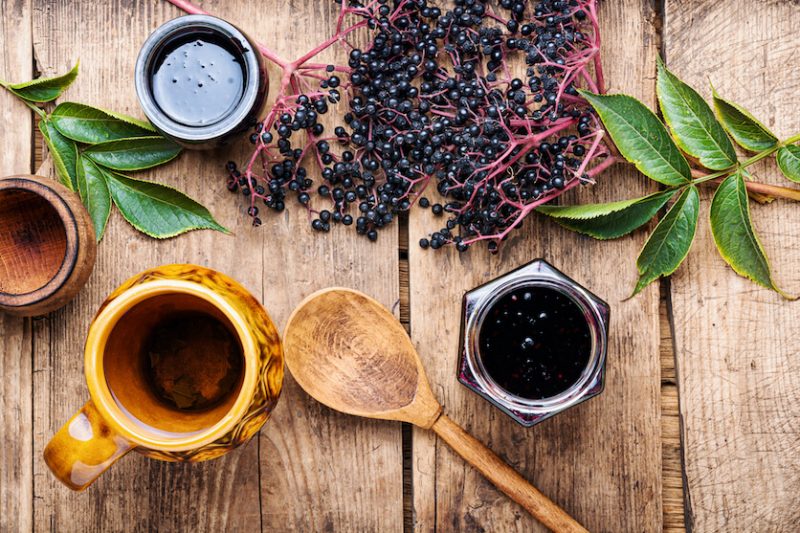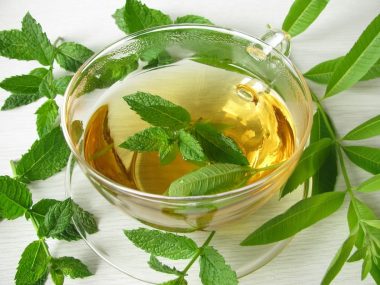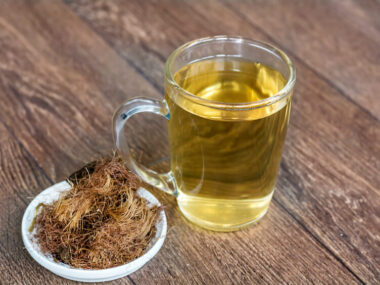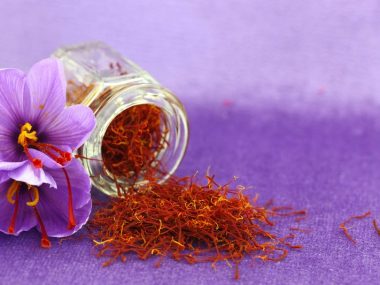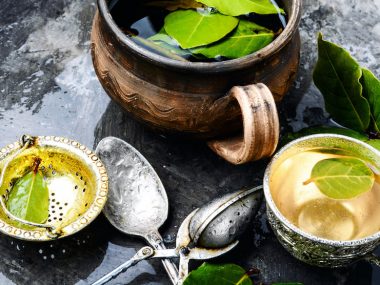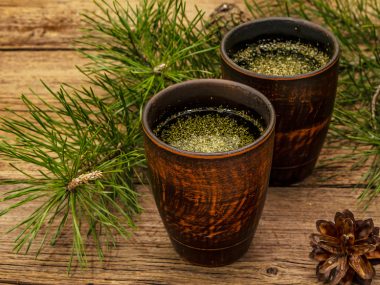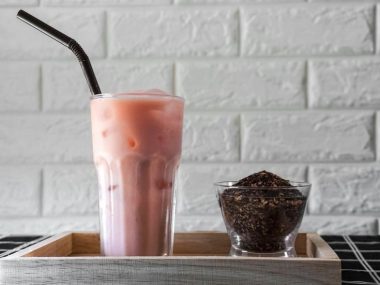What may seem unpretentiously growing yet looking yummy to pick, may pose some serious risks. Knowing how to enjoy these berries safely is the key. This read is a real eye-opener that may prevent the unknowing from being poisoned. Elderberry tea is good to enjoy, but moderation is key!
Table of Contents
What Is Elderberry Tea?
Elderberry tea is made from the berries or flowers of an elderberry plant. This tea is a tisane (herbal tea) and not a true tea. Traditional and folk medicine use elderberry tea to treat a host of ailments.
There are various elderberry teas with infusions of herbs. Elderberry and echinacea tea is perhaps the most common herb-infused elderberry tea. Some other infusions may include blackberry, lemon balm, ginger and hibiscus.
True teas with elderberry infusions are popular on the market. One such tea is black tea with elderberry and orange infusion. There are also green, oolong, and pu erh teas with elderberry blended in.
What Does Elderberry Tea Taste Like?
A standalone, unadulterated elderberry tea does not have the fruity flavor as many people think. A palatable interpretation of this tea would begin with a subtle sweetness followed by a slight earthy yet crisp, tart finish. Many tea drinkers find that a bit of sugar helps make the tea more enjoyable.
What Is Elderberry?
Elderberry (Sambucus nigra) is an herbaceous plant often grown as a bush or small tree. This plant species once belonged to the honeysuckle family. However, scientists later decided to reclassify it. There are ongoing debates among the taxonomic world about its classification. A horticultural article (A Brief Review of Recent Controversies in the Taxonomy and Nomenclature of Sambucus nigra sensu lato) points out the difficulty in identifying and classifying Sambucus species.
History Of The Elderberry
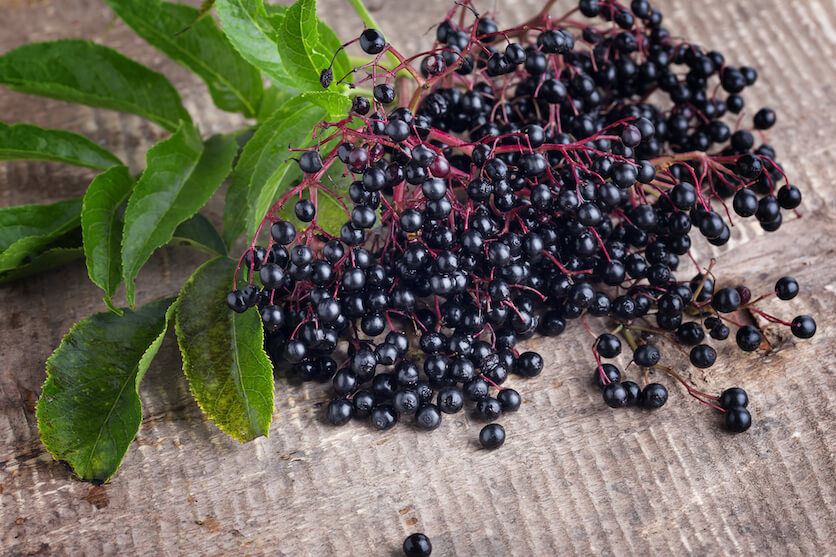
This plant has been around for a very long time and has been a part of traditional and folk medicine for hundreds of years. Indigenous tribes came to rely on elderberry for medicine, but also to paint hides, fabrics, and faces. The Cherokees were known for alleviating painful rheumatism with elderberry tea.
An archaeological dig in Switzerland discovered elderberry seeds that date back to 2,000 B.C. More seeds were discovered by archeologists in ancient food storage pits in Iowa. These seeds dated back to 1000-1300 AD. During the middle ages, it was believed that pinning elderberry leaves to the doorways of homes would ward off evil spirits. A Roman author named Pliny the Elder dyed his hair with crushed elderberries to hide the gray back in 77 AD.
Since 1887, European folk medicine has relied on elderberry tea. The use of syrup made from elderberry is noted in the British Pharmacopoeia dating back to 1788.
Associated Risks With Elderberry
Knowing about these classification and identification issues serves to support the danger that lurks behind elderberry (Sambucus species.) When it comes to consuming elderberry, you must be aware of its toxic and poisonous abilities. This toxicity varies between not only the species we mentioned but the other species of Sambucus (elderberry.)
Unless someone is trained to be able to identify the various species and any accompanying toxicity, it can become easy to mistake one for another. You should know what parts of the plant are considered toxic and if any of those parts can become edible under certain conditions.
A prime example of this is with Sambucus cerulea (also known as Sambucus mexicana, blue elderberry, or Mexican elderberry.) The European Medicines Agency published a research study (Assessment report on Sambucus nigra) which reports about a group of people gathered at a picnic who succumbed to acute poisoning after drinking elderberry juice. This juice was made from berries and leaves (crushed) from a blue elderberry bush.
Symptoms of poisoning included nausea, vomiting, dizziness, state of impairment, and more. What these people (and those who made the juice) did not know was, 1.) raw elderberry fruit is toxic if consumed, 2.) elderberry leaves should never be crushed or consumed.
How Much Caffeine Is In Elderberry Tea?
Unless the tea is blended or infused with true tea (black, green, oolong, yellow or white,) it will not contain caffeine. Elderberry tea is a tisane and tisanes are void of caffeine. However, elderberry black tea or elderberry green tea does have caffeine because of the black/green tea in it. Either of these two teas can have as much as 50 mg of caffeine in a six-ounce cup.
Is It Okay To Drink Elderberry Tea Every Day?
Any tisane should be carefully considered before enjoying, especially if consumed daily. Tisanes (herbal tea) may cause adverse reactions, side effects, interact with medications, or cause certain medical conditions to worsen. Although we cannot advise whether or not it’s safe to drink elderberry tea daily, we can recommend consulting with your healthcare provider before sampling it.
What Are The Side Effects Of Elderberry Tea?
Elderberry contains a poisonous toxin (glycoside). Ingesting raw elderberries or leaves can render a person extremely ill or worse cause fatality. Glycosides will cause the human body to produce cyanide. It is not known exactly what amount is considered fatal because it varies in each individual.
The leaves of elderberry contain a toxin (hydrocyanic acid.) The bark of the same plant contains toxins. Elderberry tea should never contain any other part of the plant such as leaves, bark, stems, or branches. Otherwise, it’s a highly toxic cocktail.
The European Food Safety Authority published an article about toxic plants (which included elderberries.) The article highlighted the toxic/adverse effects of elderberry’s branches, unripe berries, and seeds. Furthermore, it suggested that this plant poses a “high risk” in the use of elderberry preparations from ripe fruit.
Side effects of consuming unripe elderberries, or other parts of the plant can include nausea, vomiting, and diarrhea.
How Much Elderberry Tea Should I Drink?
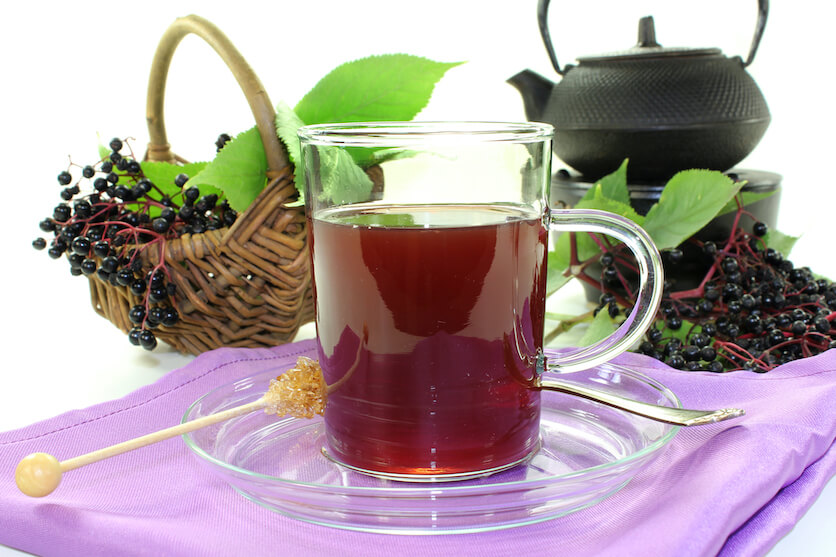
We could not find any supporting information on what is considered a safe amount of elderberry tea to consume. We are unable to provide advice or recommendations on any particular amount of this tisane to drink. Something to keep in the back of your mind is elderberry tea is used in traditional and folk medicine as a laxative. Because you don’t know what amount was used, you can be assured that it has the potential to cause such an effect if too much of this tea is consumed.
Elderberry Tea Benefits
A report on elderberry (Assessment report on Sambucus nigra L., fructus) reflects the benefits from the elderberry fruit (berries). Concoctions made from the berries have antiviral, antioxidant, antibacterial, and antihypertensive activity which was revealed through studies.
Flavonoids in the berries inhibit two strains of the flu (A and B,) and H1N1. The antioxidant bioactivity found in the berries comes from concentrations of anthocyanin. Antibiotic-resistant bacteria such as MRSA reacted to elderberries. The report goes on to state that the mechanisms of these activities require further research.
A research study (A Review of the Antiviral Properties of Black Elder Sambucus nigra L) mentions elderberry as having high levels of flavonoids and polyphenols which exhibit antioxidant ability. Furthermore, the study states elderberry as demonstrating anti-inflammatory ability, acting as a diuretic, lowering blood pressure, potential in helping with obesity, and as an antiviral. Further research is warranted to better understand these mechanisms in humans.
What Is Elderberry Tea Good For?
Substantiated data indicates elderberry may have the potential to help ward off viruses such as flu and the common cold. Oxidative stress diseases may benefit from the antioxidant activity of elderberries. More conditions other than those mentioned here can potentially benefit from elderberry tea. However, more research is required.
Is Elderberry Tea Good For High Blood Pressure?
A study done by Phytotherapy Research mentions elderberry as exhibiting potential activity in decreasing blood pressure. More research must be done to confirm this.
Does Elderberry Help With Sinus Infections?
Because elderberry exhibited antibacterial activity as noted in “A Review of the Antiviral Properties of Black Elder Sambucus nigra L,” it may have the ability to help sinus infection. However, more research is required to confirm this.
How To Make Elderberry Tea
We have an unadulterated elderberry tea for you to try at home.
Elderberry Tea Recipe
Ingredients
- 2 tablespoons of organic elderberry tea berries (purchased from a reputable commercial source)
- 4 cups of water
Directions
- Place the water and berries in a pan and bring to a boil.
- Reduce the heat and simmer for 20 minutes.
- Remove from the heat.
- Strain the berries and discard them.
- Pour the tea into a teacup and enjoy!
How Long Do Elderberries Need To Cook?
The berries must be fully ripe when harvested and thoroughly cooked before ingesting whether it’s for tea, jam, or syrup. Boiling the berries for 20 minutes is said to cause the toxins to evaporate making the tea consumable.
Be “Berry” Cautious With This Tisane
Before consuming, do your homework, and consult with your physician to make sure this tisane is safe for you to enjoy. Moderation is key to avoid unwanted side effects.
